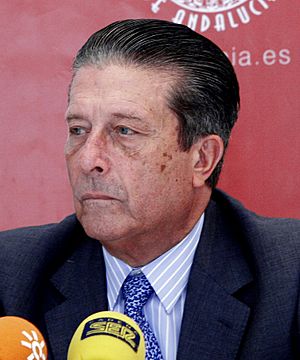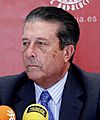Federico Mayor Zaragoza facts for kids
Quick facts for kids
Federico Mayor Zaragoza
|
|
|---|---|

Mayor Zaragoza in 2007
|
|
| Born |
Federico Mayor Zaragoza
27 January 1934 |
| Died | 19 December 2024 (aged 90) Madrid, Spain
|
| Alma mater | Complutense University of Madrid |
Federico Mayor Zaragoza (born January 27, 1934 – died December 19, 2024) was a Spanish scientist, thinker, politician, and diplomat. He was also a poet.
He is best known for leading the United Nations Educational, Scientific and Cultural Organization (UNESCO). He was the director-general of UNESCO from 1987 to 1999.
After leaving UNESCO, he kept working for peace. He joined groups like the Foundation for a Culture of Peace. He also supported the International Decade for the Promotion of a Culture of Peace and Non-Violence for the Children of the World.
Contents
Early Life and Education
Federico Mayor Zaragoza was born in Barcelona, Spain, on January 27, 1934. He studied at the Complutense University of Madrid. In 1958, he earned a special degree in pharmacy.
In 1963, he became a professor of biochemistry at the University of Granada. He was chosen to lead that university from 1968 to 1972. Later, he became a biochemistry professor at the Autonomous University of Madrid.
In 1974, he helped start the Severo Ochoa Molecular Biology Centre. He also helped create the Spanish High Council for Scientific Research. His main science work was about brain diseases. He also helped create Spain's plan for mental health.
Mayor Zaragoza was a member of important groups like the Club of Rome. He also received many awards and honorary degrees.
Spanish Political Career
Federico Mayor Zaragoza also had a career in Spanish politics. From 1974 to 1975, he worked in the Spanish Government for education and science. This was during Franco's time.
He was a member of the Spanish Parliament for the Granada region from 1977 to 1978. He also advised the President of the Government. Later, he was the Minister of Education and Science from 1981 to 1982. In 1987, he became a member of the European Parliament.
Working for the United Nations
In 1978, Mayor Zaragoza became a top leader at UNESCO. UNESCO is a part of the United Nations. It focuses on education, science, and culture.
In 1987, he was chosen to be the director-general of UNESCO. He was re-elected for a second term in 1993. In 1999, he decided not to run for a third term. He then went back to Spain to start the Foundation for a Culture of Peace.
UNESCO's Mission for Peace
During his 12 years at UNESCO, Mayor Zaragoza worked hard for peace. He wanted UNESCO to "build a bastion of peace in the minds of all people." He focused on peace, kindness, human rights, and living together peacefully.
Under his leadership, UNESCO started the Culture of Peace Programme. This program had four main goals:
- Teaching about peace.
- Promoting human rights and democracy.
- Fighting against loneliness and poverty.
- Protecting different cultures and encouraging talking between them.
- Stopping conflicts and building peace.
In 1998, the UN General Assembly announced something special. They declared the years 2001–2010 as the International Decade for the Promotion of a Culture of Peace and Non-Violence for the Children of the World. This was a big step towards his goals.
Later Life and Peace Work
In 2000, Mayor Zaragoza started the Foundation for a Culture of Peace. He was its president. He continued his work to help people move from a culture of violence to a culture of peace.
He also helped lead a group called the European Research Council Expert Group (ERCEG). This group worked to make Europe more competitive. They wanted Europe to be a leader in knowledge and science.
In 2002, he helped create the Centre Humanism, Management & Globalization (HMG). This group aimed to make globalization more human. It looked at economic, social, and cultural parts of globalization.
In 2005, Kofi Annan, the United Nations Secretary-General, asked him to co-lead the UN High Level Group for the Alliance of Civilizations (AoC). This group worked to stop extremism. It wanted to build understanding between different cultures and religions. It especially focused on relations between Western and Islamic societies.
Mayor Zaragoza was also involved with the Tangier Expo 2012 International Support Committee. He was asked by King Mohammed VI of Morocco to be its president. The goal was to host an international exhibition in Tangier, Morocco. The theme was "Routes of the World, Cultures Connecting."
He was also part of the Fondation Chirac. This foundation works to promote world peace. He helped choose winners for their Prize for Conflict Prevention.
In 2011, Mayor Zaragoza became the President of the International Commission against the Death Penalty. This group works to end the death penalty around the world.
He also joined the Nizami Ganjavi International Center Board in 2013. This group promotes culture, learning, and understanding between people.
Death
Federico Mayor Zaragoza passed away in Madrid on December 19, 2024. He was 90 years old.
Foundation for a Culture of Peace
The Foundation for a Culture of Peace was started in March 2000. Its main goal is to help build and strengthen a Culture of Peace. It does this through thinking, research, education, and direct actions.
The Foundation connects people and groups who believe in peace. Each year, it offers a course on the Culture of Peace. This course teaches about democracy, human rights, and why conflicts start.
Mayor Zaragoza believed we need a new world order. He thought this new order should focus on ethics and morals. It should balance economic growth with cultural and social well-being. He said our main goal should be to improve life for everyone.
He also supported UNESCO's ideas about peace, disarmament, and human rights. He warned against anyone controlling all information. He believed that knowledge helps people be free. He thought scientists have a very important role to play.
Since 2011, the Foundation has hosted the Global Program Women's Knowledge International. This program aims to share knowledge from women. It also works to promote gender equality and build cultures of peace.
Publications and Books
Federico Mayor Zaragoza wrote over 100 articles for science journals. He also wrote many articles for popular magazines. He published more than seventy works on education, development, and science.
He also published several books of poetry. Some of his poetry books include A contraviento (1985) and Voz de Vida, Voz Debida (2007).
He wrote many non-fiction books, including:
- Tomorrow Is Always Too Late (1992)
- Memory of the Future (1995)
- The World Ahead: Our Future in the Making (2000)
- The Crime of Silence (2011)
He also worked with other authors on books like Reinventing Globalization after the Crash.
Images for kids
See also
 In Spanish: Federico Mayor Zaragoza para niños
In Spanish: Federico Mayor Zaragoza para niños
 | Shirley Ann Jackson |
 | Garett Morgan |
 | J. Ernest Wilkins Jr. |
 | Elijah McCoy |


